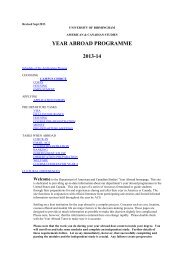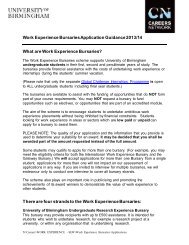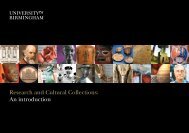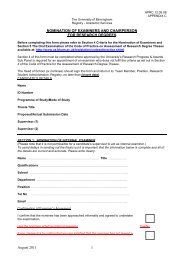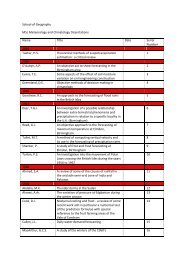reimagining-abstracts - University of Birmingham
reimagining-abstracts - University of Birmingham
reimagining-abstracts - University of Birmingham
Create successful ePaper yourself
Turn your PDF publications into a flip-book with our unique Google optimized e-Paper software.
elements, all the idols <strong>of</strong> civilization (including Antiquity) have to be annihilated in<br />
order to renew the world from a fresh start. In short, Palamas encompasses both the<br />
social function <strong>of</strong> poetry in conjunction with the constant search for the lyrical<br />
expression, and the ideal <strong>of</strong> the artist as a global citizen, one who can reflect on<br />
diachronic and universal values bequeathed by Antiquity. Palamas can be viewed as a<br />
negotiator <strong>of</strong> the past and the future with an aim to present the uniqueness <strong>of</strong> Greek<br />
identity.<br />
This presentation will aim to discuss these different tendencies in his poetry,<br />
the reflection on Ancient Greek culture, and the desire to form a comprehensive<br />
poetic plan relevant to the national identity, with an aim to explore his position in the<br />
Greek literary field. It will also attempt to <strong>of</strong>fer some insights regarding the formation<br />
<strong>of</strong> this field in Greece.<br />
Dimitris Plantzos<br />
Dead archaeologists, buried gods: Greece’s incomplete modernity<br />
Archaeology, both as an academic discipline and a state institution, has been an<br />
essential nation-building, identity-forging agent in 19 th -20 th c. Greece. As a public<br />
servant, entrusted by the state with the production <strong>of</strong> the tangible remains through<br />
which to prove the nation’s antiquity, the archaeologist plays a central role in defining<br />
the state’s strategies towards the past and its management. This however is all but<br />
ignored by the popular imaginary, as it is expressed in 20 th c. Greek literature.<br />
Illicit excavation and trade <strong>of</strong> antiquities (as in the case <strong>of</strong> Ilias Venezis’ 1939<br />
novel Galini) <strong>of</strong>fer a more appropriate means to the Greek intellectuals – themselves<br />
striving to chart their peoples’ ties to their nation’s mythical past – in order to present<br />
their case for a lost Greek national identity, manifest in the forgotten marble gods and<br />
the dry landscape, while at the same time express their own frustration at the<br />
overwhelming powers <strong>of</strong> rapid modernization (usually represented by state <strong>of</strong>ficials<br />
and foreign emissaries). In this paper I will try to investigate how Greece (as<br />
represented by its self-appointed spokespersons like Karkavitsas and Venezis)<br />
undertakes its own archaeology as a means <strong>of</strong> surviving in a rapidly changing world<br />
system and – ultimately – claiming new kinds <strong>of</strong> centrality in it. Described as cases <strong>of</strong><br />
peripheral (post)modernity these developments are the result <strong>of</strong> “incomplete” – or<br />
merely inadequate – modernization, where modernity is injected from the top down in<br />
the form <strong>of</strong> narratives constructed by colonialism, Orientalism etc. Such “always<br />
already postmodern” cultural situations, idiosyncratic or peripheral as they may be,<br />
have been produced by an effort to come up with a modernity for the Third World, in<br />
order to reshuffle hitherto accepted time- and place-frames by means <strong>of</strong> “re-centring”<br />
the globalization flow.<br />
Marinos Pourgouris<br />
Yiannis Ritsos, Marxist Aesthetics, and the Mythical Subtext:<br />
A Contribution to the Critique <strong>of</strong> Classical Greece<br />
In his Aesthetic Dimension, Herbert Marcuse argues that Marxist aesthetics must<br />
urgently clarify the relationship between Marxism and the Classical tradition. How<br />
can Marxists reconcile, he asks, the fact that the ‘great’ or ‘authentic’ Greek tragedies<br />
are at the same time works <strong>of</strong> an ancient slave society? To put it simply, Leftist<br />
writers (themselves <strong>of</strong>ten steeped in a classical education) were frequently unable to<br />
account for the disjuncture between the “greatness” or “authenticity” <strong>of</strong> the Greek<br />
tradition and the fact that this same tradition emerged in an oppressive slave-owning<br />
22


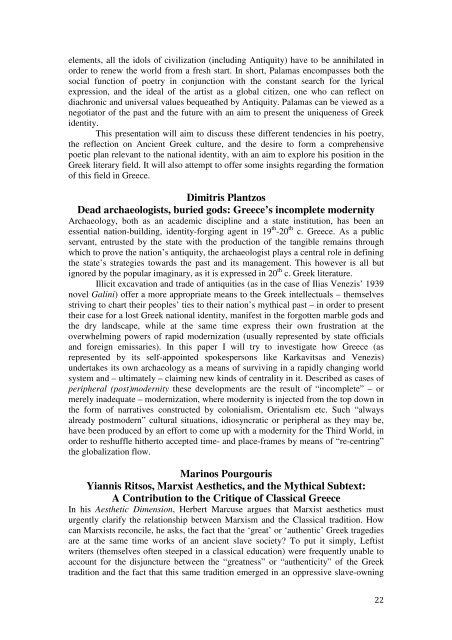

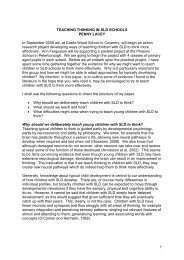
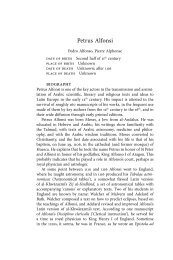
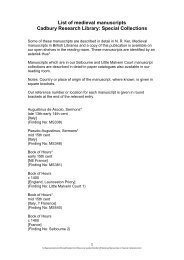
![Benyamin Asadipour-Farsani [EngD Conference abstract]](https://img.yumpu.com/51622940/1/184x260/benyamin-asadipour-farsani-engd-conference-abstract.jpg?quality=85)


